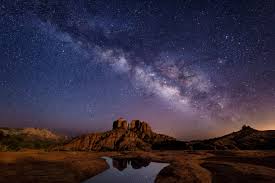Exploring the Wonders of Astronomy Sites
From ancient observatories to modern research facilities, astronomy sites around the world offer a glimpse into the vastness and beauty of the universe. These locations serve as hubs for scientific discovery, education, and stargazing experiences that inspire wonder and curiosity.
Mauna Kea Observatories, Hawaii
Perched atop Mauna Kea, a dormant volcano in Hawaii, this site hosts some of the world’s most advanced telescopes. Its high altitude and clear skies provide optimal conditions for observing celestial objects, making it a premier location for astronomical research.
Atacama Desert, Chile
The Atacama Desert is home to several astronomical observatories due to its dry climate and minimal light pollution. Visitors can witness breathtaking views of the night sky and explore cutting-edge facilities like the ALMA (Atacama Large Millimeter Array) radio telescope.
Jantar Mantar, India
Built in the 18th century, Jantar Mantar is an architectural marvel consisting of astronomical instruments used for measuring time, predicting eclipses, and tracking celestial movements. This UNESCO World Heritage Site showcases India’s rich history of astronomy.
Aoraki Mackenzie International Dark Sky Reserve, New Zealand
Designated as a Dark Sky Reserve, this location offers unparalleled views of the night sky with minimal light pollution. Visitors can marvel at the Milky Way and southern constellations while learning about indigenous Māori astronomy traditions.
Griffith Observatory, Los Angeles
Nestled in the hills overlooking Los Angeles, Griffith Observatory combines educational exhibits with public telescope viewing opportunities. Visitors can attend planetarium shows, observe celestial events, and engage in hands-on activities related to space exploration.
Whether you’re a professional astronomer or simply a stargazing enthusiast, exploring these astronomy sites can deepen your appreciation for the cosmos and ignite a sense of wonder about our place in the universe.
6 Essential Tips for Exploring Astronomy Online: From NASA to Virtual Observatories
- Visit reputable websites like NASA’s official site for accurate and up-to-date information on astronomy.
- Explore astronomy blogs and forums to connect with fellow enthusiasts and learn from their experiences.
- Use online sky maps and apps to easily identify stars, planets, and other celestial objects in the night sky.
- Check out virtual observatories that offer live streams of astronomical events such as meteor showers or eclipses.
- Join online courses or webinars offered by astronomy organizations to deepen your knowledge about the universe.
- Follow social media accounts of renowned astronomers or institutions for interesting insights and updates on space exploration.
Visit reputable websites like NASA’s official site for accurate and up-to-date information on astronomy.
When delving into the realm of astronomy sites, it is essential to rely on reputable sources for accurate and current information. Visiting esteemed websites such as NASA’s official site ensures that you access reliable data and updates regarding celestial phenomena, space exploration missions, and scientific discoveries. By exploring these trusted online platforms, enthusiasts can deepen their understanding of the universe and stay informed about the latest developments in the field of astronomy.
Explore astronomy blogs and forums to connect with fellow enthusiasts and learn from their experiences.
Exploring astronomy blogs and forums is a valuable tip for connecting with fellow enthusiasts and learning from their experiences. By engaging with online communities dedicated to astronomy, individuals can share knowledge, ask questions, and stay updated on the latest discoveries in the field. These platforms provide a space for enthusiasts to connect, discuss their passion for astronomy, and gain insights from diverse perspectives. Whether seeking advice on stargazing equipment or sharing observations of celestial events, astronomy blogs and forums offer a collaborative environment that fosters learning and camaraderie among like-minded individuals.
Use online sky maps and apps to easily identify stars, planets, and other celestial objects in the night sky.
By utilizing online sky maps and apps, you can effortlessly pinpoint stars, planets, and various celestial objects in the night sky. These digital tools provide real-time information and interactive features that enhance your stargazing experience. Whether you’re a novice sky-watcher or a seasoned astronomer, using these resources makes it convenient to identify and track celestial phenomena, allowing you to explore the wonders of the universe with ease.
Check out virtual observatories that offer live streams of astronomical events such as meteor showers or eclipses.
Exploring astronomy sites can be an enriching experience, especially when you take advantage of virtual observatories that provide live streams of celestial events like meteor showers or eclipses. These online platforms offer a unique opportunity to witness spectacular astronomical phenomena in real time, allowing viewers from around the world to come together and marvel at the wonders of the universe. By tuning into these live streams, you can immerse yourself in the beauty of the cosmos and deepen your understanding of celestial events that captivate both seasoned astronomers and amateur stargazers alike.
Join online courses or webinars offered by astronomy organizations to deepen your knowledge about the universe.
By joining online courses or webinars offered by astronomy organizations, you can delve deeper into your understanding of the universe. These educational opportunities provide valuable insights into celestial phenomena, astronomical discoveries, and the latest research in the field of astronomy. Engaging with experts and fellow enthusiasts in a virtual learning environment can enhance your knowledge and passion for exploring the mysteries of the cosmos. Whether you’re a beginner or an experienced stargazer, participating in these online programs can broaden your horizons and inspire a lifelong fascination with the wonders of space.
Follow social media accounts of renowned astronomers or institutions for interesting insights and updates on space exploration.
Stay connected to the latest developments in space exploration by following the social media accounts of esteemed astronomers and institutions. By engaging with their posts, you can gain valuable insights, updates, and fascinating discoveries in the field of astronomy. Whether it’s groundbreaking research findings, upcoming celestial events, or behind-the-scenes glimpses into the world of space science, these online platforms offer a wealth of information that can enrich your understanding and appreciation of the cosmos.

